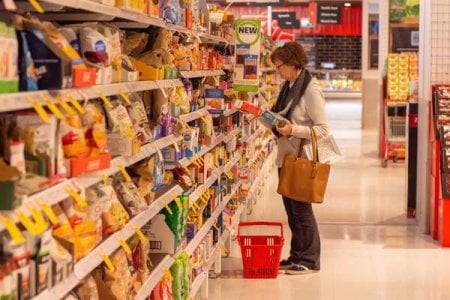Are Aussie supermarkets in trouble? Unsettling signs emerge as global crisis worsens
It's been a rough year for everyone, from small business owners to big corporations. But the news just got worse for Aussie supermarkets, as alarming signs of a global crisis are making themselves known.
Prices for basic items seem to be getting higher every week, and what once were affordable goods, like vegetables, bread, and milk, are now taking up a bigger chunk of our wallets.
Unfortunately, this could be a sign of worse things to come, as extreme weather conditions worldwide threaten to disrupt the supply of groceries.
High temperatures, dry spells, and floods are harming crop yields in many parts of the world, forcing nations to adopt measures such as export bans, which exacerbate the problem.
Floods have caused serious problems for China's rice crops, reducing the available supply. They’re now looking for extra imports to meet demands.
Meanwhile, India has seen an eleven per cent increase in food prices. Tomatoes, onions, and even the staple dal are twenty per cent more expensive than last year.
Many other countries are bound to follow suit, leading to further shortages in global food supply.
Adelaide academic Douglas Bardsley warned earlier this year, ‘New evidence suggests climate-related changes to fast-flowing winds in the upper atmosphere could trigger simultaneous extreme weather events in multiple locations, with serious implications for global food security.’
How does this affect Australia?
While Australia produces more natural gas than it needs, this global event could still impact supermarket shelves and producers.
Kirsten Rose, The Commonwealth Scientific and Industrial Research Organisation’s (CSIRO) Executive Director of Future Industries, noted: ‘Australia’s food systems currently support an estimated 70 million people across the nation and through our export markets, so it’s critical those systems are robust enough to meet future needs.’
Still, the country has plenty of reason to be optimistic. Australia is home to a sizeable and diverse agricultural industry that produces enough food to feed the entire country.
Asia Society Policy Institute Researcher Genevieve Donnellon-May said: ‘Australia is considered self-sufficient and one of the most food secure countries globally in a region where a majority of nations are actually net food importers.’
‘Notably, Singapore, which has limited natural resources, imports more than 90 per cent of its food, making it vulnerable to export bans and global food price fluctuations,’ she added.
However, Australian supermarkets are also filled with imported items. With the growing trend of nations imposing export bans to protect their own supplies, consumers might be forced to cut back on their menu.
According to the Australian Security Leaders Climate Group, the country has five days of perishable food goods in its supply network at any one time.
But with the increasingly hot weather, the production of wheat, beef, dairy and sugar might fall 20 per cent by 2050.
The rice supply
Office of National Intelligence (ONI) report commissioned by the Federal Labor Government might contain more information about the implications of global food security, but Prime Minister Anthony Albanese refuses to release the findings.
However, the rice supply issue has been known by the public.
Australia exports rice to the Middle East and Asia, mostly grown in irrigated farms along New South Wales Murray and Murrumbidgee Valleys.
Rice farmers hoped for a good year of production and prices. But next year may be different since it was reported that El Niño has officially returned
The weather has also affected the rice supply of other nations. Floods, supply, and fertiliser shortages have driven the prices to unreasonable heights. In fact, rice prices are at their highest point in 12 years.
In India, for example, extreme heatwaves affected crops and drove farmers out of their fields. In response, New Delhi halted their exports to ‘ensure adequate availability’ and ‘allay the rise in prices in the domestic market’.
‘The country’s rice production has varied in recent years but is estimated to rise by 26 per cent to 656,000 tonnes in 2023-24, presenting Australia with an opportunity to modestly boost supply in the region at a time of need,’ Donnellon-May noted about the country’s export capabilities.
‘However, sustaining such a contribution will depend on a number of factors, including climate variability and future investment in the industry.’
Supply concerns
A parliamentary inquiry earlier this year in Canberra highlighted the growing supply concern.
Fiona Davis of Farmers for Climate Action stated, ‘In the last 12 months, we have seen floods wipe out key supply chains and crops, resulting in us paying $11 for lettuce. So, while we will have enough food, getting that to people is difficult.’
More than that, Australia’s unbalanced weather system greatly affects local production. Donnellon-May claimed, ‘Climate shocks, conflicts, and competition for natural resources will continue to exacerbate food inflation and damage agricultural production.’
‘As food security is inherently part of national security, such situations exacerbate competition for food supplies and could worsen existing socio-economic and political tensions across the region. Yet, amid an increasingly fractured geopolitical environment, opportunities to prioritise cooperation over conflict still remain. Australia, as a regional leader, is well positioned to help.’
CSIRO Director of Agriculture and Food, Dr Michael Robertson, called for immediate action on this issue, ‘Recent climate extremes, the COVID-19 pandemic, and geopolitical uncertainties show that we need to prepare our food systems for a shifting risk landscape in our interdependent world.’
‘Addressing these challenges and redirecting our food systems towards greater sustainability and resilience will help us protect our food security into the future,’ he said.

Are you feeling the effects of these food shortages, members? Let us know in the comments below!
Prices for basic items seem to be getting higher every week, and what once were affordable goods, like vegetables, bread, and milk, are now taking up a bigger chunk of our wallets.
Unfortunately, this could be a sign of worse things to come, as extreme weather conditions worldwide threaten to disrupt the supply of groceries.
High temperatures, dry spells, and floods are harming crop yields in many parts of the world, forcing nations to adopt measures such as export bans, which exacerbate the problem.
Floods have caused serious problems for China's rice crops, reducing the available supply. They’re now looking for extra imports to meet demands.
Meanwhile, India has seen an eleven per cent increase in food prices. Tomatoes, onions, and even the staple dal are twenty per cent more expensive than last year.
Many other countries are bound to follow suit, leading to further shortages in global food supply.
Adelaide academic Douglas Bardsley warned earlier this year, ‘New evidence suggests climate-related changes to fast-flowing winds in the upper atmosphere could trigger simultaneous extreme weather events in multiple locations, with serious implications for global food security.’
How does this affect Australia?
While Australia produces more natural gas than it needs, this global event could still impact supermarket shelves and producers.
Kirsten Rose, The Commonwealth Scientific and Industrial Research Organisation’s (CSIRO) Executive Director of Future Industries, noted: ‘Australia’s food systems currently support an estimated 70 million people across the nation and through our export markets, so it’s critical those systems are robust enough to meet future needs.’
Still, the country has plenty of reason to be optimistic. Australia is home to a sizeable and diverse agricultural industry that produces enough food to feed the entire country.
Asia Society Policy Institute Researcher Genevieve Donnellon-May said: ‘Australia is considered self-sufficient and one of the most food secure countries globally in a region where a majority of nations are actually net food importers.’
‘Notably, Singapore, which has limited natural resources, imports more than 90 per cent of its food, making it vulnerable to export bans and global food price fluctuations,’ she added.
However, Australian supermarkets are also filled with imported items. With the growing trend of nations imposing export bans to protect their own supplies, consumers might be forced to cut back on their menu.
According to the Australian Security Leaders Climate Group, the country has five days of perishable food goods in its supply network at any one time.
But with the increasingly hot weather, the production of wheat, beef, dairy and sugar might fall 20 per cent by 2050.
The rice supply
Office of National Intelligence (ONI) report commissioned by the Federal Labor Government might contain more information about the implications of global food security, but Prime Minister Anthony Albanese refuses to release the findings.
However, the rice supply issue has been known by the public.
Australia exports rice to the Middle East and Asia, mostly grown in irrigated farms along New South Wales Murray and Murrumbidgee Valleys.
Rice farmers hoped for a good year of production and prices. But next year may be different since it was reported that El Niño has officially returned
The weather has also affected the rice supply of other nations. Floods, supply, and fertiliser shortages have driven the prices to unreasonable heights. In fact, rice prices are at their highest point in 12 years.
In India, for example, extreme heatwaves affected crops and drove farmers out of their fields. In response, New Delhi halted their exports to ‘ensure adequate availability’ and ‘allay the rise in prices in the domestic market’.
‘The country’s rice production has varied in recent years but is estimated to rise by 26 per cent to 656,000 tonnes in 2023-24, presenting Australia with an opportunity to modestly boost supply in the region at a time of need,’ Donnellon-May noted about the country’s export capabilities.
‘However, sustaining such a contribution will depend on a number of factors, including climate variability and future investment in the industry.’
Supply concerns
A parliamentary inquiry earlier this year in Canberra highlighted the growing supply concern.
Fiona Davis of Farmers for Climate Action stated, ‘In the last 12 months, we have seen floods wipe out key supply chains and crops, resulting in us paying $11 for lettuce. So, while we will have enough food, getting that to people is difficult.’
More than that, Australia’s unbalanced weather system greatly affects local production. Donnellon-May claimed, ‘Climate shocks, conflicts, and competition for natural resources will continue to exacerbate food inflation and damage agricultural production.’
‘As food security is inherently part of national security, such situations exacerbate competition for food supplies and could worsen existing socio-economic and political tensions across the region. Yet, amid an increasingly fractured geopolitical environment, opportunities to prioritise cooperation over conflict still remain. Australia, as a regional leader, is well positioned to help.’
CSIRO Director of Agriculture and Food, Dr Michael Robertson, called for immediate action on this issue, ‘Recent climate extremes, the COVID-19 pandemic, and geopolitical uncertainties show that we need to prepare our food systems for a shifting risk landscape in our interdependent world.’
‘Addressing these challenges and redirecting our food systems towards greater sustainability and resilience will help us protect our food security into the future,’ he said.
Key Takeaways
- Global weather extremes are affecting the production of key crops worldwide, impacting food prices and availability in Australia and other countries.
- More nations, like India and China, are imposing export bans to protect their food supplies, potentially affecting the imported foods available in Australian supermarkets.
- Australia's food production is expected to decline up to 20 per cent by 2050 due to extreme weather conditions, potentially putting pressure on the country's food security.
- The CSIRO has called for immediate action to strengthen Australia's food supply chains in the face of climate extremes, the COVID-19 pandemic and geopolitical uncertainties.
Are you feeling the effects of these food shortages, members? Let us know in the comments below!








